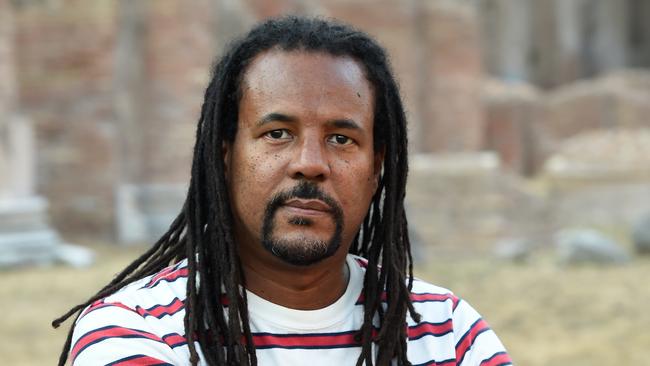Novelist Colson Whitehead: Resilience in face of cultural dumbness
A lifelong New Yorker, Colson Whitehead has seen adversity, and endured.

For a few days in June, New York had a little taste of apocalypse. Smoke from wildfires in Canada turned the sky an ill-looking orange. Visibility dropped to a few hundred metres. People searched for their masks again. Colson Whitehead stayed at home.
“I was just like, same shit, different day, you know,” says the only living novelist to have won the Pulitzer Prize for fiction twice, for The Underground Railroad in 2016 and The Nickel Boys in 2019. Having seen the 1980s crack epidemic, 9/11, Hurricane Sandy and the pandemic come and go, Whitehead, 53, bore the haze with a New Yorker’s fatalism. “There are periods where the city’s in crisis and then we hopefully bounce back. In the 1970s crime was at an all-time high and the city was bankrupt. And out of that depressed climate we got punk and disco and hip-hop. Writers were working, artists were working. That New Yorker resilience is always there.”
Resilience and reinvention are qualities Whitehead has poured into Ray Carney, the furniture salesman and middleman for stolen goods at the heart of his hugely enjoyable 2021 heist novel, Harlem Shuffle, and now its follow-up, Crook Manifesto. Part of a proposed trilogy set in Harlem from the 1960s to the 1980s, the stories combine the family man-turned-crook dynamic of Breaking Bad with the hard-boiled humour of crime novelists such as Chester Himes and Elmore Leonard. The blend of social realism, melodrama and farce prompted another comparison in my mind: Whitehead is fast becoming the Dickens of black American life.
He has been writing novels since the 1990s, but it was really with his slavery fantasia, The Underground Railroad – published in the midst of Black Lives Matter protests – that he hit the big time. You might expect that an author anointed “America’s storyteller” on the front of Time magazine and lauded by Oprah Winfrey and Barack Obama for his masterful explorations of race would have settled into a solemn middle age. Whitehead is, in fact, nothing like that. Crook Manifesto is fast, fun, ribald and pulpy, with a touch of Quentin Tarantino in its deadpan dialogue and don’t-take-this-too-seriously tone. And when we meet over several Coca-Colas at a neighbourhood Italian in Greenwich Village, the author proves to be dry and downbeat, with a surprisingly high-pitched laugh that usually ends with a snort.
He is disinclined to use his platform as a novelist to discourse on the state of the world. “That period of, like, Norman Mailer pontificating over things is over – and that’s good.”
Indeed, his favourite word is a dismissive “dumb”. I bring up the recent Elizabeth Gilbert affair, in which the best-selling Eat Pray Love author pulled her Siberia-set historical novel from publication after she was accused of romanticising Russia. “The whole thing’s kind of dumb … I wouldn’t be putting it in a drawer if I’d spent all that f..king time on it.”
How does he feel about authors coming under attack for writing about characters of different racial backgrounds to their own? “Well, it’s dumb. But people get called out because they lack the empathy and intelligence to help their black character or their Muslim character live on the page, and they’re like: ‘Oh, the politically correct are attacking me!’ It’s like: ‘No, do better next time and shut the hell up’.” Indeed, he dismisses cancel culture. “Look at (the comedian) Dave Chappelle: ‘I’m being cancelled!’ He then won a Grammy! It’s just another dumb aspect of our culture – we’re culturally dumb.”
Are we dumber than we used to be? “No, we’re a pretty dumb species. It’s just that technology allows us to express it in different ways.”
Initially I worry the whole interview will consist of short, misanthropic remarks that don’t do justice to his intelligence on the page – but he shows a sweeter side when he talks about his children. He has an 18-year-old daughter from his first marriage and a son, 9, with his second wife, literary agent Julie Barer. I ask if his daughter has read any of his books and he says she’s “read Underground”, while some of her friends studied The Nickel Boys, which is a measure of his canonical status. Or, as he puts it: “I was in my underwear typing it on my computer, then two years later it’s being taught in her high school.” But these grand accolades tend to obscure what a hilarious writer Whitehead is. His early fiction – The Intuitionist (1999), John Henry Days (2001) – was a riot, and as he moved forwards, from zombie horror to detective stories, you could sense a desire to avoid the common tropes of black American fiction. What made him want to tackle slavery?
“Writing about race in unexpected ways was important and fun and interesting, but I think dealing with slavery and segregation was always waiting,” he says. “I was not mature enough when I was younger to write about race in the way I did in Underground. It took time for me to become a better writer.”
So just because Crook Manifesto features pimps, low-lifes and a jewel heist doesn’t mean it is devoid of seriousness. “It’s a critique of capitalism and an analysis of race relations, but also it’s: what’s the best way to break into a bank? Because that’s the way my brain works.” He sees the heist genre as a neat way of exploring the human condition. “You can plot and plan and then fate intervenes and you’re stuck. You can walk away from the crime scene with sacks of money – or it’s a complete disaster, you’re double-crossed, you get shot or arrested. The heist has these two different philosophical and existential trajectories, which I like.”
Whitehead was born into relative privilege in Manhattan – his parents ran an executive recruiting company and he attended the prestigious Trinity School, an experience he explored in Sag Harbor (2009) – although he has spoken of how he retreated into comics and video games to escape his father’s alcohol-fuelled rages. After studying at Harvard in the late 1980s he worked at The Village Voice newspaper and established himself as a spiky cultural commentator, satirising the antebellum novel (or “Southern Novel of Black Misery”) and the wave of optimism that greeted Obama’s election (“Finally, a Thin President,” he wrote in a column for The New York Times). But snark has its limits. He says writing Underground “forced me to get out of my hipster media critic voice. I think it can be a bit of a crutch after a while. I can’t be that social critic guy when I’m writing a book about slavery or Jim Crow or Carney. So I have to push myself more”.
I see a fiercer side of Whitehead when I ask about the state of American democracy, in particular the Supreme Court and its assaults on affirmative action and abortion rights. “We have these reactionary nut jobs who have job security for life and they do what they want. They interpret the constitution faithfully or completely ignore it depending on what they want to do. Nothing we can do about that. They’re just going to rule us according to their insane prejudices and we’re completely powerless.”
He is less despairing now that Donald Trump is out of the White House, but still feels depressed that Joe Biden is seeking re-election (“It’s terrible … just not as terrible”). And he worries about the generation who grew up under Trump. “There are six-year-olds who saw Donald Trump on TV every day for several years who will think that’s what a president is. That a completely bigoted, small-minded moron and his abuse is the model for presidential behaviour. That’s terrifying.”
When I suggest that democracy is in crisis all over the world, he shrugs. “If you grew up in a racist country that’s persecuted your ancestors for 200 years, it’s hard to …” He pauses, then offers some cautious optimism. “Look, people are very corrupt, but obviously I have it better than my parents and my grandparents, and hopefully my kids will too. But we’re very slow to change and there are too many racist dummies who are not going anywhere.”
So would he ever consider leaving America? “No, I’ll always be a New Yorker.” His Harlem trilogy is “a love letter, but also a damning indictment” of New York, a city that is “incredibly cruel” and “a place of profound reinvention”. What will he do when the trilogy is over? Try a different genre? He snorts. “I joke I’m working on a romance set during the Russian Revolution. I say that there are a lot of white people in it, so for research I’m going to watch Golden Girls reruns.”
Whatever it is, I sense he is going to enjoy it. “I’m not here to write books for the approval of some abstract literary critic or because I want to be on the cover of Time magazine again. I’m here to write books that give me pleasure.”
Three essential Colson Whitehead novels:
● Sag Harbor (2009) – a wistful coming-of-age story about a black teenage geek trying to reinvent himself.
● The Nickel Boys (2019) – a passionate, gut-wrenching story about a reform school under Jim Crow. My favourite of his novels.
● The Underground Railroad (2016) – this ingenious adventure yarn about an escaped slave uses sci-fi flourishes.
The Sunday Times


